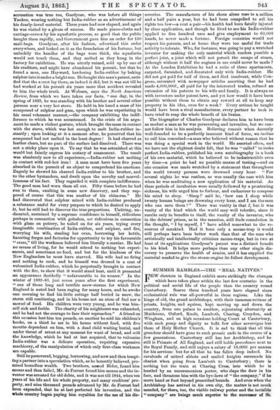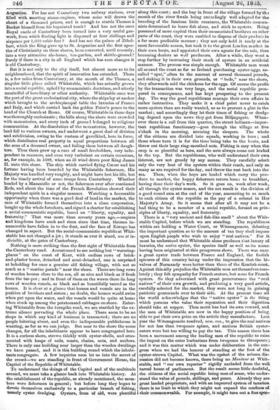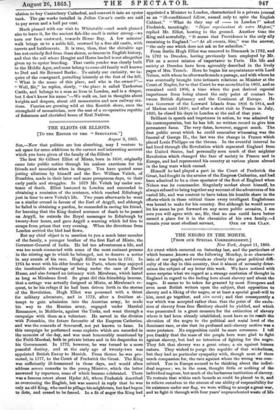SUMMER RAMBLES.—THE " REAL NATIVES."
'DEW districts in England exhibit more strikingly the changes 12 which have taken place within the last few centuries in the political and social life of the people than the country round Canterbury. Scarce three hundred years have elapsed since ecclesiastical rule was all-powerful in these regions. Like the kings of old, the grand archbishops, with their immense retinue of priests, knights, and squires, kept moving up and down the country, from one palace to another, sojourning alternately at Maidstone, Oxford, Snole, Lambeth, Charing, Croydon, and Wingham, and on high occasions holding Court at Canterbury, with such pomp and dignity as befit few other sovereigns but those of Holy Mother Church. It is sad to think that all this grandeur should have gone to such prosaic ends in the course of a few generations. Canterbury still has her Archbishop, and he still is Primate of All England, and still holds precedence next to the Royal Family, and still enjoys a salary of 18,000/. per annum for his services: but for all that he has fallen deep indeed. No cavalcade of mitred abbots and mailed knights surrounds his chariot when going from Lambeth to Canterbury ; there is nothing but the train at Charing Cross, into which he is hustled by an unceremonious porter, who slaps the door in his face, and threatens him with the bye-laws of "the company," if he move hand or foot beyond prescribed bounds. And even when the Archbishop has arrived in his own city, the matter is not much mended, for there, too, the visible railway porter and the invisible " company" are beings much superior to the successor of
Augustine. For has not Canterbury two railway stations, ever filled with snorting steam-engines, whose noise will drown the
chant of a thousand priests, and is enough to startle Thomas it Becket himself from his bepainted tomb? And has not the once Royal castle of Canterbury been turned into a very useful gas- work, from which floating light is dispersed at four shillings and sixpence per 1,000 cubic feet ? And has not the palace of Ethel- bert, which the King gave up to St. Augustine and the first apos- tles of Christianity on these shores, been converted, until recently, into a very attractive ale-house, tea-garden, and skittle-ground? Surely if there is a city in all England which has seen changes it is old Canterbury.
But it is not only to the city itself, but almost more so to its neighbourhood, that the spirit of innovation has extended. There is, a few miles from Canterbury, at the mouth of the Thames, a singular little place called Whitstable, which has actually grown into a social republic, upheld by communistic doctrines, and utterly unmindful of hereditary or other authority. Whitstable once was the port of the great ecclesiastical city, where the ships lay at anchor which brought to the archiepiscopal table the luxuries of France and Italy, and which carried back the golden Peter's pence to the head of the Church at Rome. Of course, Whitstable in those days was thoroughly ecclesiastic ; the hills along the shore were crowded with monasteries, and every inch of ground belonged to religious communities. At the dissolution of the monasteries, however, the land fell to various owners, and underwent a great deal of division and subdivision, owing to the custom of gavelkind, here in force, which distributes real property in equal proportions between all the sons of a deceased owner, and failing them between all daugh- ters. Thus there grew up a race of small freeholders, very inde- pendent in manners, and even very turbulent on certain occasions, as, for example, in 1688, when an ill wind drove poor King James
H. unto this shore. The ship which carried flying Caesar and his
fortune having been boarded by the Whitstable fishermen, His Majesty was handled very roughly, and might have lost his life, but for the timely arrival of some troops from Canterbury. Whether headed by a Masaniello or not, the fishermen ever after continued Reds, and about the time of the French Revolution showed their independent spirit in a singular manner. Watching a favourable opportunity when there was a good deal of land in the market, the men of Whitstable formed themselves into a close corporation, bought up the whole foreshore, and signed a charter for establishing a social-communistic republic, based on "liberty, equality, and fraternity." That was more than seventy years ago,—empires and kingdoms have sunk and risen since that time, thrones in-
numerable have fallen in to the dust, and the face of Europe has changed in aspect. But the social-communistic republic at Whit- stable has not changed a jot ; it stands as ever it stood, une et in- divisible, at the gates of Canterbury.
Nothing is more striking than the first sight of Whitstable from the Canterbury road. Accustomed to see nothing but " watering- places " on the coast of Kent, with endless rows of brick- and-plaster boxes, detached and semi-detached, one is surprised at beholding for once a genuine old fishing village, with not so much as a " marine parade " near the shore. There are long rows of wooden houses close to the sea, all as nice and black as if fresh from the tar-pot ; and in front of them on the waves there lie long rows of wooden vessels, as black and as beautifully tarred as the
holism. It is clear at a glance that houses and vessels are in the position of brothers and sisters ; no doubt, the houses would swim
when put upon the water, and the vessels would be quite at home when stuck up among the potatoesand cabbages onshore. Enter- ing Whitstable from the turnpike road, we are startled by the ex-
treme silence pervading the whole place. There seem to be no
shops in which any kind of business is transacted; there are no people loitering about, and even the indispensable publichouse is wanting, as far as we can judge. But near to the shore the scene changes, for all the inhabitants appear to have congregated here. It is a curious shore, strewn thickly with oyster-shells, and orna- mented with heaps of sails, masts, chains, nets, and anchors.
There is only one building near larger than the wooden dwellings we have passed, and it is this building round which the inhabi- tants congregate. A few inquiries soon let ns into the secret of the crowd—we are standing in front of Government House, the Capitol of the Republic of Whitstable.
To understand the doings of the Capitol and of the multitude around, we must take a glance back into Whitstable history. At the establishment of the republic, as already mentioned, the mem- bers were fishermen in general; but before long they began to devote themselves exclusively to a particular branch of fishing, namely oyster dredging. Oysters, from of old, were plentiful
along this coast; and the bay in front of the village formed by th 3 mouth of the river Swale being exceedingly well adapted for the breeding of the luscious little creatures, the Whitstable commu- nists determined to leave fish alone, and stick to oysters. Being possessed of more capital than their unassociated brethren on other parts of the coast, they were enabled to dispose of their produce in a far more profitable manner ; they not only held it ready at the most favourable season, but took it to the great L3113011 market in their own boats, and appointed their own agents for the sale, thus becoming dealers as well producers. After a while, they went a step further by increasing their stock of oysters in an artificial manner. The process was simple enough. Whitstable men went all around the coast as far as Ireland purchasing oyster-eggs, so- called " spat," often to the amount of several thousand pounds, and sinking it in their own grounds, or " beds," near the shore, they afterwards sold the chickens for the eggs. Of course the profit. by the transaction was very large, and the social republic pros- pered in consequence, and has kept prospering to the present. day. The way the good republicans manage their own affairs is rather instructive. They make it a chief point never to catch more oysters than are really wanted, so as to prevent a glut in the market ; and accordingly they let their times of fishing or dredg- ing depend upon the news they get from Billingsgate. When- ever there is a call from this quarter, the street bellman—impor- tent republican functionary—goes through the village at five o'clock in the morning, arousing the sleepers. The whole of the citizens are divided into squads, working in turn ; and those whose turn it is for the time being take to the boats, and throw out their large ring-mouthed nets. Fishing is easy when the crop is so plentiful as here, and the nets always come out loaded to the top. But the republicans, who well understand their own interest, are not greedy by any means. They carefully select. only the very best of the oysters within their reach, and only as. many as are required for the day, and throw the rest back into the sea. Then, when the hops are loaded which carry the pro- duce to market, the happy fishermen return home to breakfast, having done their day's work. So it goes on, week after week, all through the oyster season, and the net result is the division of a good round sum at the end of the year, amounting to as much to each citizen of the republic as the pay of a colonel in Her• Majesty's Army. So it seems that after all it may not be a. bad thing to be a member of a social republic, formed on prin- ciples of liberty, equality, and fraternity.
There is a "very ancient and fish-like smell" about the Whit- stable Capitol, before which we are standing. The republicans. within are holding a Water Court, or Witenagemote, debating the important question as to the amount of tax they shall impose upon English people who wish to enjoy "real natives." For it. must be understood that Whitstable alone produces that luxury of luxuries, the native oyster, the species itself as well as its name. having been originated at this prosperous shore. There was once. a great oyster trade between France and England, the foolish epicures of this country being under the impression that the bi- valves of Normandy were better than those of the Kentish coast.. Against this silly prejudice the Whitstable men set themselves reso- lutely ; they felt sympathy for French orators, but none for French. oysters. So they advertised with great preseverance the "real. natives" of their own growth, and producing a very good article, carefully selected for the market, they were not long in gaining patriotic gourmands over to their side. At the present time all the world acknowledges that the "native oyster" is the thing which persons who value their reputation and their digestion should take at supper. Thus merit has had its own reward, and_ the men of Whitstable are now in the happy position of being, able to put their own price on the article they manufacture. Last. year the Witenagemote resolved, nem. con., to give the real natives; for not less than twopence apiece, and anxious British oyster- eaters were but too willing to pay the tax. This season there has been a movement among the leading men of the republic to raise, the impost on the outer barbarians from twopence to threepence e and it was this matter which was under deliberation in the con- gress when we had the honour of standing at the foot of the oyster-strewn Capitol. What was the upshot of the solemn dis- cussion did not become known, there being no Moniteur at Whit- stable, and "our own reporter" rigidly excluded from the well. tarred house of parliament. But the result seems little doubtful„ the citizens of the social republic being men of sense, who under- stand the value of pounds, shillings, and pence. Already they are- great landed proprietors, and with an improved system of taxation there is no limit to which they might not expand the confines of their nommcmwealth. For example, it might tun out a fine speo-
ulation to buy Canterbury Cathedral, and convert it into an oyster tank. The gas works installed in Julius Caesar's castle are said to pay seven and a half per cent.
Much pleased with our visit to Whitstable—and much pleased also to leave it, for the ancient fish-like smell is rather strong—we turn our face eastward, towards Herne Bay. A few minutes' walk brings us to a noble hill, crowned by a fine old castle, with turrets and battlements. It is true, then, that the chivalric age has not entirely fled from these shores, so famous in English history, and that the soil where Hengist and Horsa landed is not altogether given up to oyster breeding. That castle yonder was clearly built in the Middle Ages, and must belong to some old family well known to Dod and Sir Bernard Burke.. To satisfy our curiosity, we in- quire of the coastguard, patrolling leisurely at the foot of the hill, " What is the name of this place, and who is the owner ?"— " Well, Sir," he replies, slowly, " the place is called Tankerton Castle, and belongs to a man as lives in London, and is a draper, but I don't know his name."—We walk on, lost in thoughts about knights and drapers, about old monasteries and new railway sta- tions. Fancies are growing wild at this Kentish shore, once the stronghold of monasticism, now the seat of a co-operative republic of fishermen and cherished home of Real Natives.
































 Previous page
Previous page